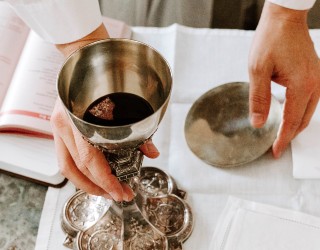Celebrate Sunday Mass - 9.12.21
Join us for Sunday Mass.
9/12/2021 (4 years ago)
By Deacon Keith Fournier
Sept 12, 2021 -- 24th Sunday in Ordinary TimeDear Catholic Online Community and Catholic Online School students...
I AM HAPPY TO OFFER EACH OF YOU AN INVITATION TO SUNDAY MASS ON THE 24th Sunday in Ordinary Time in the Catholic Diocese of Tyler. Our participation at Holy Mass is always enhanced when we take time to prayerfully reflect on the readings. This is one of the reasons we are encouraged to read the readings for Holy Mass before we come to assist.
In our first reading for this 24th Sunday in ordinary time, we heard an excerpt from the fiftieth chapter of the Book of the Hebrew Prophet Isaiah. Isaiah was a Messianic Prophet. This Book contains many prophecies pointing to the promised Messiah which the Jewish people longed for.
This chapter, when reflected upon centuries later by Christians, was clearly one of those prophecies. It speaks of a "Suffering Servant" whom the Lord would send. As we read and listen to it, we know that Jesus was and is the fulfillment of this, and all the other prophetic utterances in this Book of the Hebrew Scriptures, what Christians call the Old Testament.
In our second reading, from the Second chapter of the Letter of St James, the Apostle is writing to the early Jewish believers in Jesus Christ in all the early Christian churches. He refers to them, in the first verse as "the twelve tribes in the dispersion".
The section we heard today is often misunderstood. Some in the past tried to argue that it offers a teaching that our "works" save us, thereby setting up a dichotomy between faith and works. Nothing could be farther from the truth. The early Christians knew that.
What James was saying is that our living faith should change the way we live. Our "talk" should be evident in our "WALK". To be a follower of Jesus means to live differently. And we are given the grace for that to happen through Jesus!
Finally, the Gospel we heard today, from the 8th chapter of the Gospel of St. Mark, brings it together, underscoring that it is Jesus Christ who saves us. We must turn to Him, acknowledge Him as Lord, repent of our sins, and be Baptized into His Mystical Body, the Church. That begins a process of ongoing conversion.
The same question Jesus asked his is asked of each one of us - WHO DO YOU SAY THAT I AM? It is not just asked once - but continually. It is meant to inform the response of our entire life.
How we answer that question determines who we will become and how we will live. It is a question which cannot be answered indirectly, or halfheartedly. It is not enough to rely on what - some say. The question is profoundly personal as well as public. Who is Jesus Christ to ME? And how does my answer affect the way I live.
Our answer to the question of who Jesus Is - challenges us to live our entire lives differently. Christianity is a WAY of Life. Before they were called Christians in Antioch (Acts 11:26) the early followers of Jesus Christ were often referred to as "the Way". The Apostle Paul, in recounting his own conversion, speaks of having persecuted "this Way" (Acts 22: 3-16) prior to his encounter with the Risen Lord on the Road to Damascus. This expression "the Way" reveals a profoundly important aspect of the understanding of the early Christians.
They believed and proclaimed that the Christian faith was to be expressed in a new way of living. It still is. Our relationship with Jesus Christ and membership in His Body, the Church, is meant to effect change in every aspect of our lives as human persons - and influence the way in which we participate in our families, our associational groups, our work, commerce, and civil society.
To be a Christian is a new way of being a human person. The humanity of Jesus is being revealed in each one of us, as we cooperate with the grace of salvation. The Image of God, marred and wounded by sin, is being restored. The likeness is growing by grace.
The first time I read the masterful book entitled Mere Christianity by CS Lewis was when I was a young man, grappling with this very question. Lewis wrote: "I am trying here to prevent anyone saying the really foolish thing that people often say about Him: 'I'm ready to accept Jesus as a great moral teacher, but I don't accept His claim to be God.' That is the one thing we must not say. A man who was merely a man and said the sort of things Jesus said would not be a great moral teacher.
"He would either be a lunatic - on the level with the man who says he is a poached egg - or else he would be the Devil of Hell. You must make your choice. Either this man was, and is, the Son of God: or else a madman or something worse.
"You can shut Him up for a fool, you can spit at Him and kill Him as a demon; or you can fall at His feet and call Him Lord and God. But let us not come with any patronizing nonsense about His being a great human teacher. He has not left that open to us. He did not intend to."
TODAY, the question is presented to you - and to me - once again - as we hear this Gospel passage of the encounter between Jesus and the Apostles. Who is Jesus Christ, for me? And, if He is our Savior and Lord, does our life reflect this identification?
God bless you,
Deacon Keith Fournier
Dean of Catholic Online School
Copyright 2026 Catholic Online.

